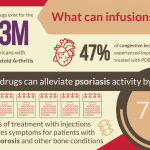Osteoporosis Infusion Medications: What is Right for You?
As you grow older, your bones break down. Those bones often rebuild themselves but can’t always keep up the pace, so the bones become weaker. There is no cure for osteoporosis, but you can slow it down. You might even stop it with osteoporosis infusion medications.
Since 1970, osteoporosis was discovered, diagnosed, experimented on and treated in different ways. There have been significant advances from fracture epidemiology to bone-density measurements. There have also been advances in the options for therapy provided to patients to prevent and treat osteoporosis.
When you treat osteoporosis, you can rebuild the bones and stop bone loss. Also, maintaining a healthy diet and exercising can help with preventing more bone loss and reduce fractures. But, changing your lifestyle isn’t always enough in most cases. When lifestyle changes aren’t enough, you must consider medication, as it can be the most effective treatment.
What osteoporosis infusion mediations are there?
Bisphosphonates
Bisphosphonates are a group of drugs that slow bone loss. You can take bisphosphonates by mouth and through IV infusion or injection. Note that with oral preparations, there are risks of digestive issues. But, this drug is normally well tolerated. You can reduce the risks as long as you follow the instructions regarding your medicine.
The most common bisphosphonates are alendronate, ibandronate, risedronate and zoledronic acid. You can take alendronate daily or weekly. Ibandronate is only for postmenopausal women. You can take this monthly or through an IV every three months. You can take risedronate daily, weekly or monthly. Finally, you can take zoledronic acid yearly through an IV.
It is common for doctors to prescribe bisphosphonates to postmenopausal women to prevent and treat osteoporosis.
Prolia (Denosumab)
Prolia is a prescribed osteoporosis infusion for treating symptoms. It’s also used to increase bone mass for patients with specific types of cancer. You might receive Prolia as a substitution for bisphosphates. This is if bisphosphates didn’t work well enough or you couldn’t use them. If you’re likely to have fractures, doctors might also suggest this medication.
You can receive Prolia through IV injections every six months. Prolia can lower the amount of calcium your body contains. So it’s critical to maintain high vitamin D and calcium levels before taking this medication.
Evenity (Romosozumab)
Evenity works to strengthen your bones. It aims for a specific type of protein called sclerostin. That protein regulates the breaking down of bones and repair. You take injections monthly for one year, while each dose consists of two injections.
Women who have gone through menopause receive this medication. It’s even for women with a high risk of fracture. It is also prescribed to those who have tried other osteoporosis treatments but stopped for lack of effectiveness or severe side effects.
Evenity contains common side effects such as headaches and joint pains. This medication can also increase the risk of a stroke, heart attack and even death. It’s critical that you not take this drug if you’ve had a stroke or heart attack in the past year.
Hormone Therapy
This medication comes as a shot that you must receive daily and take for at least two years. After that, you’ll need to switch to a different kind of medication to help maintain the added bone.
Calcitonin hormone comes as a spray or shot and helps only to reduce spine fractures. This is only for women who are at least five years past menopause. The FDA only recommends it as a last option since it may be linked to cancer. Parathyroid hormone grows bone and is mainly used for those with very low bone density and who have already had fractures.
The possible side effects of hormone therapy are headaches, breast tenderness, skin irritation, weight gain, premenstrual syndrome, menstrual bleeding and depression. To help cut the side effects, try experimenting with doses and regimens.
Some women take this medication for more than five years. They experience an increased risk of cardiovascular disease, stroke and breast cancer. Women using this are recommended to take breast and cardiovascular health monitoring programs. You can do this with your doctor.
Taking estrogen without progesterone will cause increased risks of endometrial cancer. You should explore other options first. The risks listed above can lead to a ratio of risk/benefit when prolonging the use of hormone therapy taken only for treating postmenopausal osteoporosis.
Take Precautions
It is always best to take precautions when using these medications. Carefully using them can help eliminate specific side effects. Avoiding these side effects can allow you to receive all the helpful benefits of the treatments quickly.
Osteoporosis medications can preserve bone strength, improve bone mineral density and prevent any fractures. Medications can also either reduce the rate of bone breakage or help speed up the process of building more bone. Both work towards the goal of strengthening your bones and reducing fractures.
Despite the side effects, the majority of medications are well tolerated. They’re also very effective when it comes to increasing bone density.
Osteoporosis infusions in Raleigh
Medication management is a lot to think about. Having a doctor who you can feel confident and comfortable with is crucial. There are many options for osteoporosis infusion treatment, and one of them is right for you. Our dedicated Infusion Center offers a safe and relaxing environment for infusion therapy. For more information, please contact us today!





